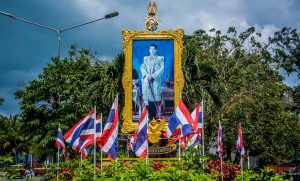In an intriguing new twist to Thailand’s ongoing political drama, Germany’s foreign minister has said that King Maha Vajiralongkorn should not be engaging in politics from inside the country, where he spends the majority of his time.
Foreign Minister Heiko Maas made the comments in the Germany Bundestag on October 7, responding to a question from a Greens lawmaker about the rising calls for democratic reform within Thailand.
“We have made it clear that politics concerning Thailand should not be conducted from German soil,” Maas told the Bundestag. “If there are guests in our country that conduct their state business from our soil we would always want to act to counteract that.”
Vajiralongkorn spends the majority of his time at a retreat in the Bavarian alps, and only returns to Thailand for brief visits. Shortly after taking the throne, he demanded that the new Thai constitution be written so as to allow him to spend time outside Thailand without appointing a regent in his absence, allowing him to reign from abroad.
The German rebuke comes as the Thai monarchy weathers unprecedented calls for reform from a rising protest movement that has culminated in a series of public demonstrations in the capital Bangkok.
The youthful protesters have called for the resignation of Prime Minister Prayut Chan-o-cha, who led the country’s last coup d’etat in 2014. They have also aired the once-taboo question of monarchical reform, demanding that the power of the institution be subordinated to a new and genuinely democratic constitution. Any discussion of the monarchy has long been chilled by Thailand’s harsh lese-majeste law, which penalizes any criticism of the monarchy with prison terms of up to 15 years.
During the German parliamentary debate, Greens parliamentarian Frithjof Schmidt asked whether the European Union would consider suspending free trade talks with Thailand due to the regime’s constant efforts to undermine democracy. Maas replied that while the EU preferred dialogue to punitive measures, Germany would not rule out suspending trade talks “if the Thai regime continues this behavior that we have taken note of from here.”
The EU halted trade talks after a coup d’etat in May 2014, but resumed the negotiations after a deeply flawed general election last year, which saw Prayut cobble together a civilian government.
The German comment comes as Thai opposition groups prepare for a large demonstration in the capital Bangkok on October 14. Organizers expect that the protest, which will take place on the 47th anniversary of the 1973 student-led uprising that culminated in the downfall of the military government led by Field Marshal Thanom Kittikachorn, will be the largest yet.
Arnon Nampa, a human rights lawyer and leading figure in the protest campaign, said at a press briefing on October 8 that the demonstrations would continue to press for the resignation of the government and the reform of the monarchy. “People who want any or all of these changes should join the movement,” Arnon said. “We’re looking to increase pressure on the government.”
The protest is set to comprise more than 30 pro-democracy groups from around the country, and organizers expect up to 100,000 people to attend, around twice as many participants as a demonstration last month.
This follows comments from the new chief of the Royal Thai Army, who warned student protesters about pushing their demands too far. The army commander Gen. Narongphan Jitkaewtae, who acceded to the top job on October 1, warned student protesters not to create conditions that would create severe conflict. “The use of freedom must not violate others’ rights. You must also take responsibility for your actions if you break the law,” he said.
When asked whether he could pledge not to a launch a coup, like so many of his predecessors over the decades, Narongphan replied, “Every army chief has been asked this question. They invariably say the chance are zero on condition! That no one causes a conflict that leads to violence and unrest.”

































